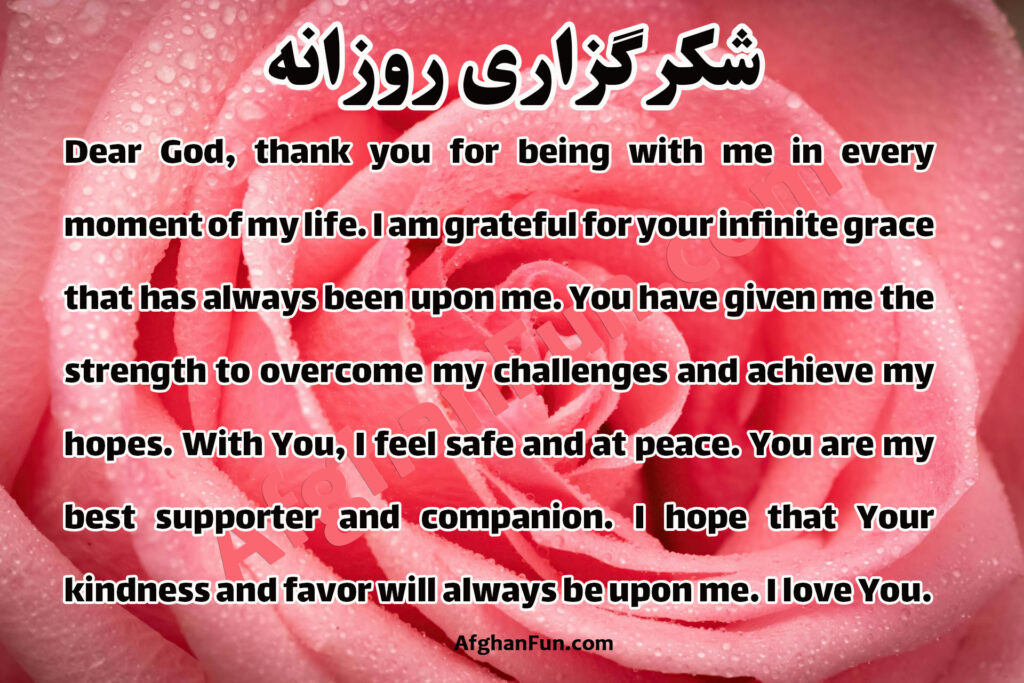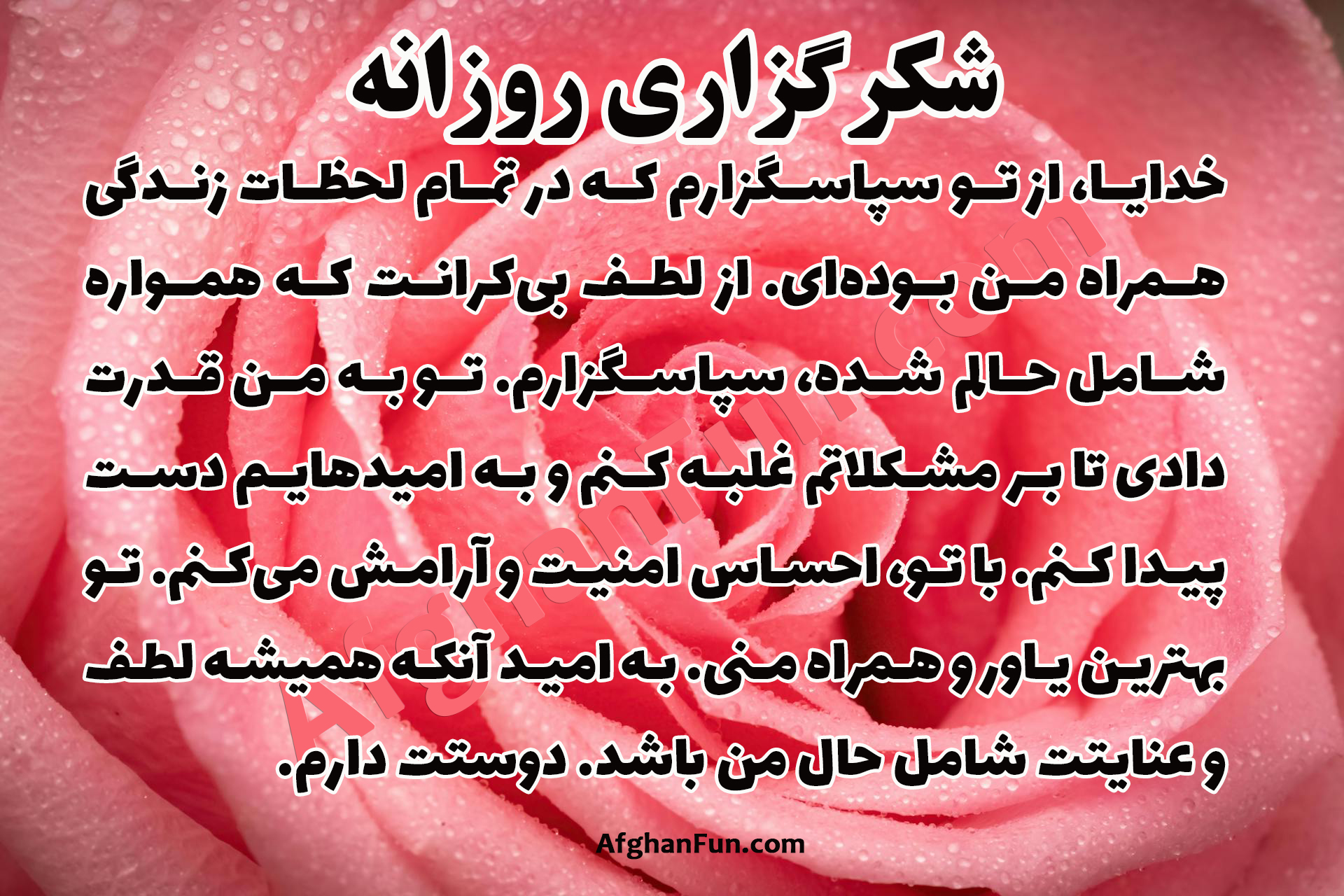
Dear God, thank you for being with me in every moment of my life. I am grateful for your infinite grace that has always been upon me. You have given me the strength to overcome my challenges and achieve my hopes. With You, I feel safe and at peace. You are my best supporter and companion. I hope that Your kindness and favor will always be upon me. I love You.
Худоё, аз ту ташаккур мекунам, ки дар тамоми лаҳзаҳои зиндагӣ ҳамроҳи ман будӣ. Аз лутфи бесаросарият, ки ҳамеша ба ман неъмат дод, ташаккур мекунам. Ту ба ман қувват додӣ, то бар мушкилотам ғалаба кунам ва ба умедҳоям расам. Бо ту, эҳсоси амният ва оромӣ мекунам. Ту беҳтарин ёр ва ҳамроҳи ман ҳастӣ. Умедворам, ки ҳамеша лутф ва раҳматат мансуби ман бошад. Ман туро дӯст медорам.
خدایا، از تو سپاسگزارم که در تمام لحظات زندگی همراه من بودهای. از لطف بیکرانت که همواره شامل حالم شده، سپاسگزارم. تو به من قدرت دادی تا بر مشکلاتم غلبه کنم و به امیدهایم دست پیدا کنم. با تو، احساس امنیت و آرامش میکنم. تو بهترین یاور و همراه منی. به امید آنکه همیشه لطف و عنایتت شامل حال من باشد. دوستت دارم.
Daily Thanksgiving in Islam
In Islam, gratitude (shukr) is a fundamental principle and is deeply embedded in the daily lives of Muslims. Thanksgiving is not limited to a specific occasion but is a continual practice of acknowledging and appreciating the blessings bestowed by Allah. Here’s a comprehensive overview of the concept of daily thanksgiving in the Islamic view:
1. Concept of Gratitude in Islam
- Quranic Teachings: The Quran emphasizes the importance of gratitude in several verses. Allah commands believers to express their thanks: “And (remember) when your Lord proclaimed: ‘If you give thanks (by being grateful), I will give you more (of My Blessings); but if you are thankless (i.e., disbelievers), verily My punishment is indeed severe.’” (Quran 14:7)
- Prophetic Traditions: The Prophet Muhammad (peace be upon him) demonstrated and taught the importance of gratitude. He regularly expressed thanks to Allah and encouraged his followers to do the same. One famous saying states, “He who does not thank people, does not thank Allah.”
2. Forms of Daily Thanksgiving
- Salah (Prayer): Muslims perform five daily prayers, which are a direct form of gratitude to Allah. Each prayer includes verses from the Quran that praise and thank Allah.
- Dhikr (Remembrance of Allah): Engaging in dhikr, such as reciting phrases like “Alhamdulillah” (All praise is due to Allah), “Subhanallah” (Glory be to Allah), and “Allahu Akbar” (Allah is the Greatest), serves as a daily reminder of Allah’s blessings.
- Du’a (Supplication): Muslims often make personal supplications to thank Allah for His guidance, provisions, and mercy.
- Good Deeds: Acts of kindness and charity are viewed as expressions of gratitude. The Prophet Muhammad said that helping others is a form of giving thanks to Allah for one’s own blessings.
3. Mindfulness and Recognition of Blessings
- Daily Reflection: Muslims are encouraged to reflect on their blessings daily, recognizing everything from basic necessities to personal achievements and relationships. This practice cultivates a mindset of appreciation.
- Family and Community: Expressing gratitude within families and communities strengthens bonds. Sharing meals and acknowledging Allah’s provisions during gatherings fosters a culture of thankfulness.
4. Thankfulness in Adversity
Islam teaches that gratitude should be expressed not only in times of abundance but also during hardships. The Quran mentions the importance of patience (sabr) and maintaining faith in Allah’s wisdom. Believers are reminded that challenges can be opportunities for spiritual growth and deeper appreciation of Allah’s mercy.
5. Benefits of Gratitude
- Spiritual Connection: Regularly expressing gratitude strengthens the believer’s relationship with Allah and enhances spiritual well-being.
- Psychological Impact: Studies show that gratitude can lead to improved mental health, increased happiness, and a more positive outlook on life.
- Social Harmony: A grateful attitude fosters positive relationships and encourages a supportive community, promoting harmony and reducing conflict.
Conclusion
In Islam, daily thanksgiving is not merely a ritual but a way of life. It involves recognizing and appreciating Allah’s countless blessings, both big and small, in all aspects of existence. By cultivating a habit of gratitude, Muslims deepen their faith, improve their mental and emotional well-being, and strengthen their connections with Allah and their communities.











